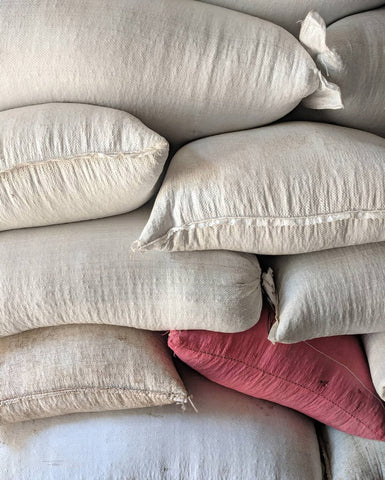Drew Johnson, the owner of Bows Coffee Roasters, has been working in the coffee industry for a long time. Johnson worked for a number of different roasters before opening his own roastery in 2011. Over the past few years, Johnson has developed a makeshift buying group to help support coffee farmers in Mataquescuintla. The community is currently resisting the operation of a Canadian-owned silver mine that is threatening to contaminate their land. We caught up with Johnson to learn about his approach to sourcing coffee and what he has learned throughout his years in the industry.

-What is your approach to sourcing coffee?
The biggest thing I have learned over the years is that you have to be willing to recognize your mistakes and pivot accordingly, not try and pretend.
I don’t know how to perfectly do any of this, and I don’t think that the previous generation, at least the perceivable industry, did a very good job preparing us for being progressive coffee buyers. If anything, we had nice words, good intentions, and ambitions but very little practical information and strategy.
As a roaster, we try to focus on cleaning up our existing relationships with farmers and reassess them constantly to make sure they are as ethical as we think they are or want them to be. We go country by country and we assess who we are working with there, who they are as people, and what their ethics are—it takes a long time.
In a nutshell, it’s an audit of our own menu. We try to break off little pieces and try to improve each and recognize where we don’t have a lot of influence and minimize that on our menu or, be upfront that our whole menu isn’t as clean and tidy as the pressure to suggest it is. When I say the pressure to suggest, it’s because everyone in the industry is claiming that what they do and how they do things differently makes them stand out and makes them more ethical. I think we have grown quieter in those claims over the years as we have recognized we are influencing very little. We aren’t going to make claims until we feel like we are actually standing on something.
-What are the things that were taught to you when you first started sourcing coffee that you are staying away from?
Cliches like “we source the best coffee and pay well above market price.” The market price is not a good indicator of a progressive stance. There is tension between quality first and ethical buying. They aren’t mutually exclusive but you do have to have a program built around what happens if or when you’re working with a producer and they have a bad year. How do you absorb that into your company? Where do you find an outlet for a coffee that scores, say an 84, that you are committed to? When people say they are quality first what happens when there is bad coffee along the line; that happens for every producer. We still clearly have a lot to do and a lot to learn.




